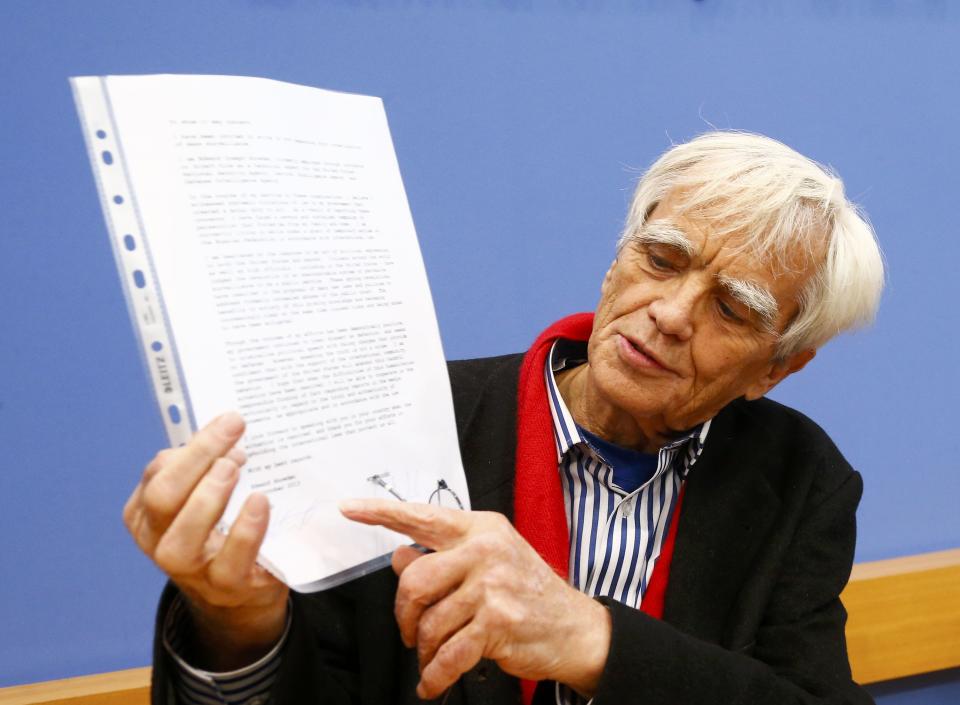Snowden writes to Germans to seek support in spy row
By Stephen Brown and Alexandra Hudson BERLIN (Reuters) - Fugitive U.S. intelligence contractor Edward Snowden has told Germany he is counting on international support to stop Washington's 'persecution' of him for revealing the scale of its worldwide phone and Internet surveillance. In an open letter to a country at the center of the row over U.S. spying on allies, Snowden said his revelations had helped to "address formerly concealed abuses of the public trust". Complaining that Washington continued to "treat dissent as defection" and speaking of a "sustained campaign of persecution" that he said had forced him into exile in Russia, Snowden wrote that "speaking the truth is not a crime." "I am confident that with the support of the international community, the government of the United States will abandon this harmful behavior," read his letter to Chancellor Angela Merkel, the German parliament and German federal prosecutors. Snowden gave the letter to German lawmaker Hans-Christian Stroebele, who presented it to the media in Berlin on Friday. Stroebele, a maverick 74-year-old member of parliament for the opposition Greens, gave the letter to reporters shortly after getting off a plane from Moscow, where he met Snowden on Thursday at a secret location. The letter did not carry any specific address, beginning simply: "To whom it may concern." Snowden's leaks about the targets and methods of the National Security Agency (NSA), from alleged mass scanning of emails to the tapping of world leaders' phones - including Merkel's - have infuriated U.S. allies and placed Washington on the defensive. U.S. authorities want him handed over to face espionage charges for illegally disclosing government secrets. The head of Britain's MI5 Security Service has said the material he divulged to journalists was a gift to terrorists. WILLING TO TRAVEL The 30-year-old ex-CIA employee and NSA contractor, who fled to Moscow via Hong Kong earlier this year and was given political asylum by President Vladimir Putin, said he had been forced into exile for acting according to his "moral duty". Snowden said he was ready to travel to Germany to help its parliamentary inquiry into NSA bugging of Merkel's mobile phone - but added: "I would rather go before the U.S. Congress, or a committee of the U.S. Congress and lay the facts on the table." Neither option is likely in the immediate future. Germany's parliament wants to talk to him about the NSA's secret monitoring of Merkel's phone and the communications of a host of politicians and business people, according to reports. But visiting Germany would pose grave diplomatic problems for Merkel and endanger Snowden's asylum status back in Moscow. "The asylum he has in Russia gives him security in Russia but not in Germany," Stroebele, who sits on parliament's control committee which oversees the work of the German intelligence agencies, told a news conference. "If he left he would not be able to return to Russia. He would come to Germany if he could be safe here or in another country," said the white-haired MP, who is the first foreign politician known to have met with Snowden in Russia. Some politicians want Snowden put on a witness protection scheme, others suggest sending a parliamentary committee to Moscow. German officials say there is no discussion of granting him asylum, which he would have to request on German soil, and there is a pending U.S. request to arrest him if he comes. "Edward Snowden is in Russia under a temporary refugee status and, if he leaves Russian territory, he may lose it," the Russian lawyer representing Snowden, Anatoly Kucherena, was quoted as saying by Russian Interfax news agency. "If some countries have questions to Snowden, they can send them to him and he will decide," said the lawyer. Putin says Russia will only shelter Snowden if he refrains from activities that could harm the United States or Russian-U.S. relations. Asked if meeting German investigators would violate these terms, a Putin spokesman declined to comment. "We'll find a way of making it possible, if Mr Snowden is prepared to speak to German representatives," German Interior Minister Hans-Peter Friedrich said. Merkel has dispatched senior aides to Washington demanding assurances there will be no wholesale secret surveillance, after Snowden revealed that the NSA typically monitored half a billion phone calls, emails and text messages in a month. The NSA said this week that it was European governments like France and Spain who collected telecommunications data in bulk and then handed it to the United States. (Additional reporting by Andreas Rinke in Berlin and Gabriela Baczynska and Alexei Anischuk in Moscow; Writing by Stephen Brown; Editing by Mark Trevelyan)



